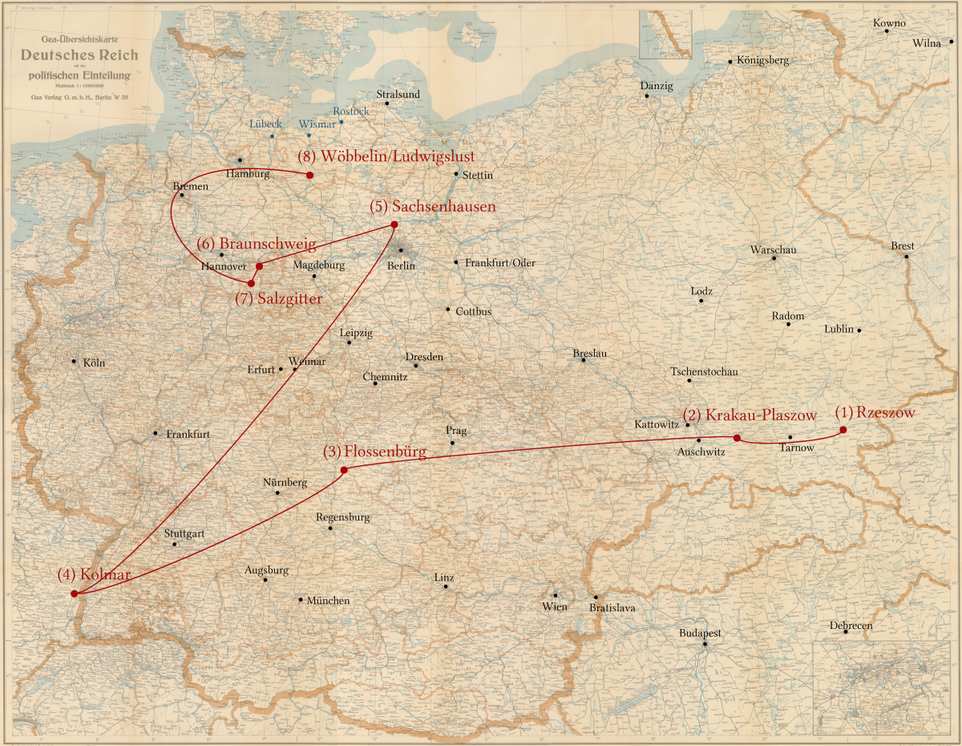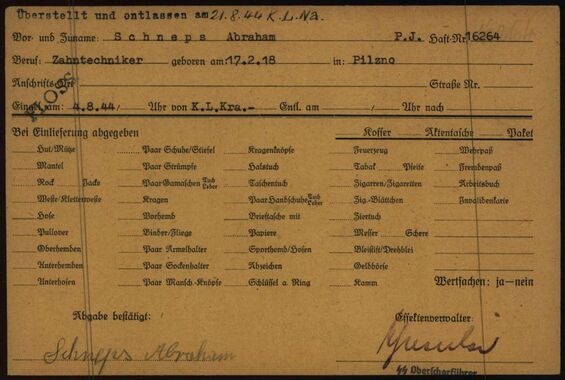The Biography of Abraham Schneps, Pilzno
Short biography and stations of his persecution
Places and times of imprisonment according to statements by Abraham Schneps:
- born on 22 Dec. 1918 in Pilzno/Poland
- 1925-1934 primary schools
- 1935-1937 Grammar school, training as a dental technician
- 8/1940-6/1943 Rzeszow ghetto
- 6/1943 Plaszow ghetto
- 6/1943-7/1943 Flossenbürg concentration camp
- 7/1943 -? Neuengamme concentration camp/Braunschweig subcamp
- Summer/1943-4/1945 Neuengamme concentration camp/Ludwigslust subcamp (Wöbbelin)
Abraham Schneps was 22 years old when the persecution began.
The dates are probably transscription errors.
Abraham Schneps lost his parents and three brothers to the Holocaust.

Reconstructed times and places of imprisonment according to prisoner records Flossenbürg/History of the Rzeszow ghetto/excerpt from file - ITS T/D 253799
- Born on 22 Dec. 1918 in Pilzno/Poland
- 1925-1934 primary schools
- 1935-1937 grammar school, training as a dental technician
- August 40 to 22 July 1944 Rzeszow ghetto, forced labour camp at Reichshof aircraft engine factory (?)
- then Krakow-Plaszow concentration camp (deathcamps.org; health affidavit)
- 4 August 1944 Flossenbürg concentration camp (Flossenbürg documents)
- 21 August 1944 Natzweiler-Struthof concentration camp/Kolmar subcamp, prisoner number 33380 according to ITS information (ITS T/D 253799)
- 12 October 1944 Sachsenhausen concentration camp (ITS information, deathcamps.org: "the prisoners were taken to KZ Sachsenhausen, where the group was broken up and sent to various camps in Germany. By the war's end, of the original contingent of about 600 Rzeszow Jews, only a few dozen of them had survived ")
- Neuengamme concentration camp / Braunschweig subcamp (Büsing-NAG) (affidavit of imprisonment, witness statement)
probably end of 1944 (see Braunschweig (Büsing-NAG) or 1 February 1945 (deutschland-ein-denkmal.de) Salzgitter-Watenstedt (affidavit of health; see also "Reichswerke Hermann Göring") - Neuengamme concentration camp/Ludwigslust satellite camp (Wöbbelin)
- 2 May 1945 Liberation
Before the War
I am making this affidavit in connection with my application for compensation for damage to my body and health. Before the outbreak of the persecution, I lived with my family in Rzeszow. I enjoyed a good and normal state of health and do not remember ever having been ill. After finishing primary schools, I attended grammar school for two years and then trained as a dental technician with a dentist. Before the war, I worked as a dental technician and had a nice and secure income.
Source: Unless otherwise stated: Konrad Kittl files, Abraham Schneps affidavit
From Start of the war to the Krakow ghetto
When the Nazis occupied my homeland, my ordeal began. I was soon put to dirty and humiliating forced labour. In the ghetto that was soon set up, we lived in the most terrible conditions, crammed into the smallest of spaces, were given hardly anything to eat and were constantly harassed. We lived in a state of terror before the deportations. I had to do forced labour every day just to stay alive. My health began to deteriorate during these years. I suffered from chronic stomach problems and lost a lot of weight. I was separated from my family in June 1943. My beloved parents and my three brothers were taken to Auschwitz and I never saw them again.
Forced Labour Camps
I myself was dragged to the Plaszow concentration camp. I didn't have to work here, but was in quarantine, so to speak. A few weeks later I was deported to the Flossenbuerg concentration camp and from there to the Natzweiler/Kolmar concentration camp. Then I was sent to Sachsenhausen. But here, too, they drove me on and I was in the Braunschweig/Ludwigslust concentration camp. I had to work in the Herman-Goering works in Wattenstedt. At this point I was just a wreck. I had to work day and night shifts in an ammunition factory making bombs.
In 1944, I had an accident on one of the milling machines. I hit the machine with my right hand and my little finger was torn off. I was taken to the camp hospital. I was treated here. I had to reckon with being sent to an extermination camp at any moment because I was no longer useful. So I soon reported back to work. During the time that followed in the Ludwigslust concentration camp, I couldn't work fast enough and was repeatedly beaten. A guard who couldn't stand me punished me even more, so that I didn't get any food for two days. I nearly starved to death then.
After the War
When I was liberated, I was just a shadow of a man. I received medical help from Red Cross doctors and later went back to Poland to look after my family, but couldn't find anyone and fled to West Germany at the end of 1946, where I stayed until I immigrated to Israel in 1949. I have lived in the USA since 1960. Due to the cruel experiences during the time of persecution, the illnesses without treatment, the constant abuse, the injuries, the constant fear of death, the loss of my entire family, my health is still impaired to this day. I declare that I am prepared to be examined by a medical officer of the German Consulate. I confirm the accuracy of my statement with my signature on oath.
Notes
Further Sources
-----
Office for Compensation
Darmstadt VIII/7D18492/18/A/DP/Schn 1965-1972?
Notes
The dates given by the claimant in his affidavits regarding his imprisonment contradict the dates given in the prisoner records. Also, the Ludwigslust/Wöbbelin camp did not exist at this time. According to Flossenbürg documents and ITS information, Abraham Schneps came from Plaszow to Flossenbürg in August 1944, and shortly afterwards to Natzweiler and Sachsenhausen (ITS T/D 253799). If Schneps was at the Reichshof aircraft engine factory, then the places of detention in the statements match the information in the ITS and prisoner records. These place and time details also match the history of Rzeszow on deathcamps.org/USHMM ghetto description. February 1942: Rzeszow ghetto is closed. 7-19 July 1942: First action. Shootings, deportations, transfers to ZAL Lisia Gora (aircraft engine factory). 7 August 1942: 2nd action. 15 November 1942: 3rd action. The aircraft engine factory was dissolved in the summer of 1944 (deathcamps.org)/on 22 July 1944 (deutschland-ein-denkmal), the group of prisoners were sent to Plaszow (1 week), Flossenbürg, Natzweiler, Sachsenhausen, according to deathcamps.org. According to the ITS, Schneps was also in the Ravensbrück concentration camp at an unspecified time.
Picture Credits
- Individuelle Häftlingsunterlagen KZ Flossenbürg, 1.1.8.3/10996628/ITS Digital Archive, Arolsen Archives

